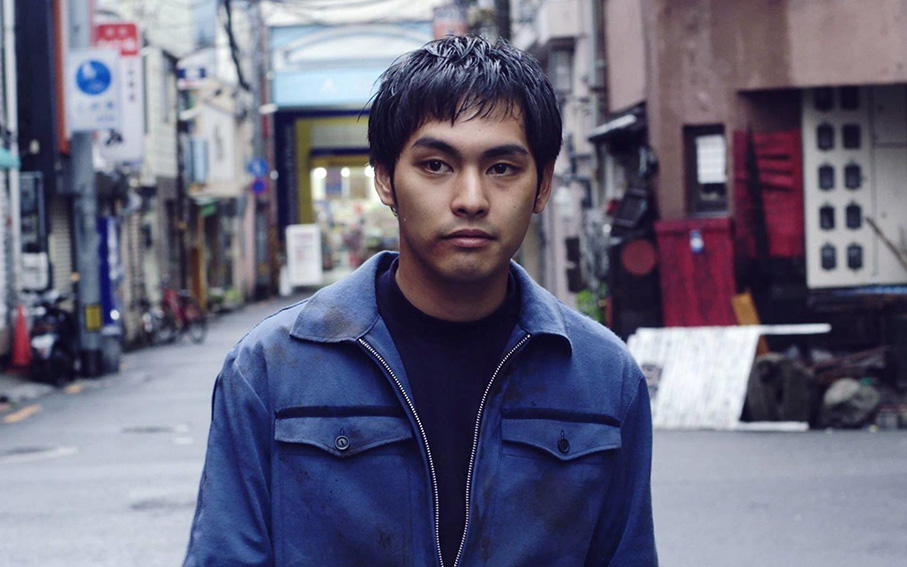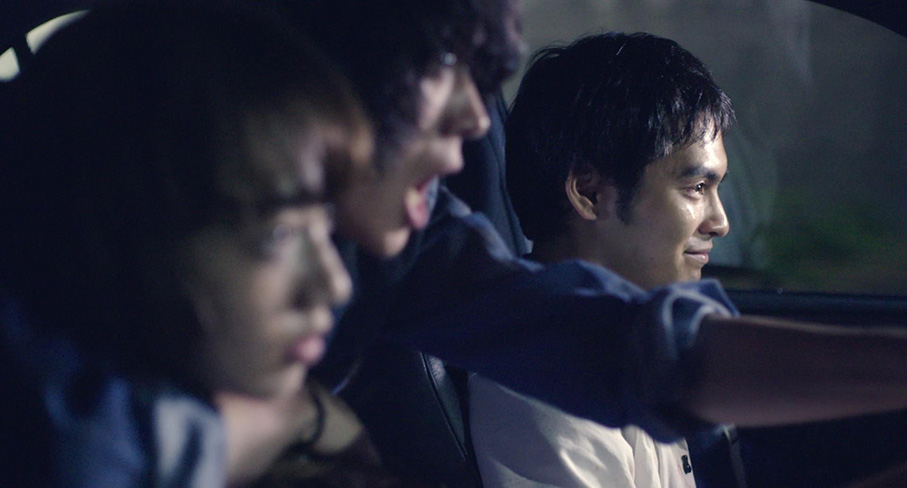|
How's this for a parable of the world we now find ourselves precariously living in? A young man repeatedly throws himself into fights, irrespective of how unlikely the odds are of him winning, and whatever the outcome he just keeps coming back for more and refuses to admit defeat, even when it's clear that he has lost the battle. If this seems to paint him in heroic colours, well that's because I'm being slightly misleading for the sake of social metaphor, as there's nothing remotely heroic about Taira, the 18-year-old central character of the decidedly confrontational Destruction Babies, the latest film from Yellow Kid director Mariko Tetsuya.
To give you an idea whether this is a film you'll want to add to your personal watch list, consider how the first 20 minutes or so unfold. High school kid Shota (Murakami Nijirô) is walking along the bank of a river when he sees his brother Taira (Yagira Yûya) on the opposite side engaged in a fist fight with members of a local youth gang. Taira faights gamely but takes quite a beating before the gang are scared off by the arrival of Taira's elderly neighbour, who then asks the boy when he's going to stop doing this, a question to which Taira has no answer. To the aggressive accompaniment of music constructed from what sounds like randomly hit notes on a range of instruments (which is hellishly effective as an expression of Taira's likely mental state), Taira walks into town, and on arrival starts a fight with the first man he lays eyes on. The would-be victim leaves the beaten Taira in a semi-conscious daze, then meets up with some friends and is in the process of telling them about his violent encounter when Taira strides up and beats them all silly. A short while later, he's scavenging a waste bin for food and finds himself being mocked and spat at by three cycling youths, whom he promptly attacks, then takes one of their bikes and heads off towards his next confrontation.

And so it continues. The first half of Destruction Babies plays out as a series of violent street brawls broken up only by short scenes in which Shota hangs out with his mates and tries to convince them to help him locate his brother, initially unaware of the mayhem he is wreaking. Unknowingly drifting in and out of both stories, meanwhile, is young female kleptomaniac Nana (Komatsu Nana), who by chance is set to become an unwilling component of Taira's dangerous game.
To call the fighting here violent doesn't really do it justice. Rarely have I seen more brutally realistic street fights in a film than the ones that play out here. Nothing feels choreographed or rehearsed about them, and while logic dictates that there was a degree of both, the scrappy viciousness of the combat always feels disturbingly real, a sensation enhanced by the stunned reactions of bystanders and the fact that many of the blows clearly make contact. Indeed, after a while I started to wonder if some of the fights were shot with hidden cameras (they are often framed wide and from only one or two angles) and staged before unsuspecting members of the public.
While there's a (self-) destructive, Fight Club-esque expression of maleness to Taira's determination to beat and be beaten by almost any man he encounters, this all changes when he's joined by the mouthy Yuya (Suda Masaki), whose friends were a target of Taira's random aggression and who becomes awed by his utter refusal to back down and his single punch downing of gangster businessman Tono. It's through him that we get to really appreciate the nastiness of the violence that Taira is unleashing, as while Taira only targets men and seems to favour taking on whole groups rather than individuals, Yuya picks exclusively on young women, knocking them down and beating them and recording the whole thing gleefully on his mobile phone. And while Taira stays largely silent, Yuya likes to loudly mouth off at his victims and just about anyone else within earshot, spouting sexist insults and boasting about his actions like the appalling little immature shit that he is. It's this element of his personality – and by implication, a sizeable proportion of the young male population – that Taira's lead-by-example behaviour inadvertently gives free reign to, unleashing a hateful and misogynistic side of Yuya that was previously suppressed by societal mores and the likelihood of a punitive response. More than once I longed for Taira to turn on Katahara and slap him six ways from Sunday for deviating from his personal modus operandi, but he never seems to care what his tag-along companion does as long as it doesn't negatively impact his own plans, whatever they may actually be.

Destruction Babies is a damned difficult film to critically evaluate, as many will see it for what it appears to present itself to be, a series of similarly staged violent confrontations that appear to lead nowhere or have any ultimate purpose. But like the string of fatal shootings from which Alan Clarke's brilliant Elephant is constructed, it's not so much the violence of these fights that stays with you but cumulative impact of watching the same scenario play out over and over with no clear indication of how this self-created cycle can be broken. There seems little doubt that we're being quietly encouraged to read Taira's behaviour in metaphorical terms, as despite the documentary realism of the fights (even the sound of the impact of fist of flesh is sickeningly authentic), the idea that Taira could take the beatings that he does without suffering serious bruising, broken bones, and even skull fractures is frankly preposterous. A while after his assault on Tono, for instance, we learn that his knockout blow put the man in hospital, yet Taira repeatedly endures a far greater level of physical punishment (including more than one seriously sharp kick to the head) but is always able to get up afterwards, dust himself off and go looking for his next fight without a hint of any serious injury. And given that several of the fights take place in full public view and last for some while, the no-nonsense Japanese police are sorely conspicuous by their absence here.
Destruction Babies is without doubt the most nihilistic film I have watched in some time, and as a coming-of-age story it's like none you're ever likely to have seen. On the surface, at least, its message is straightforward if deeply discomforting, and whether it's also attempting to say something profound about human behaviour, the suppression of evolutionary instincts, or how we are shaped by our formative years is hard for me say after a single viewing. It's never an easy film either to watch or digest, but remains oddly compelling throughout, and like the real-world fist fights it so accurately recreates, you may be disturbed by what you are watching, but it's troublingly hard to turn your head away.
The Japanese convention of surname first has been used for Japanese names throughout this review
|